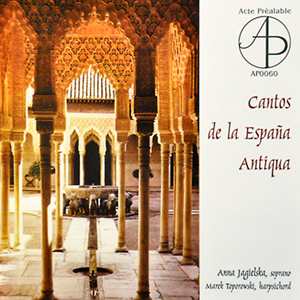CANTOS DE LA ESPANA ANTIQUA – Songs of Ancient Spain
Acte Prealable 2000
Artists:
Anna Jagielska-Riveiro: soprano
Marek Toporowski: klawesyn

ORDER VIA THE WEBSITE OF THE ARTIST:
Audio CD - 14 EUR
Finding a common feature of court and folk music was not an easy task, but following these two routes, looking for “common places” was a unique adventure. The idea of combining these two worlds is expressed by the singer who releases emotions using spontaneous, improvised adorments close both to the technique of playing folk instruments as well as ancient performance practices.
We started to arrange this program with Renaissance music but soon it turned out that the harpsichord sounds surprisingly beautiful with Sephardic music, although probably these songs have never been performed this way before. The harpsichord is a fairly young instrument but in this music it reveals its whole history: we can hear the sound of a Medieval psaltery, a harp, a lute and maybe a guitar, too. Thousands of ways of unbraiding garlands of arpeggio accords make it possible to illustrate each word, each emotion enclosed in the lyric…
The CD was recorded in 2000, at the church Nawiedzenia NMP, 2 Przyrynek street in Warsaw. It was issued by the publishing house Wydawnictwo Acte Prealable 2000.
Booklet in for languages: Polish, English, French and Spanish.






